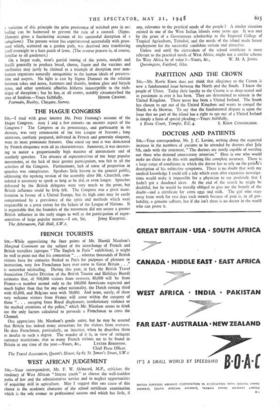THE HAGUE CONGRESS
SIR,—I read with great interest Mr. Peter Fleming's account of the Hague Congress. may I add a few remarks on another aspect of the Congress ? The Congress in its proceedings, and particuarly in its deoates, was very reminiscent of the late League of Nations ; long addresses, carefully prepared, delivered in French and generally eloquent, were its most prominent features. One could say mat it was dominated by French eloquence with all its characteristics. Moreover, it was interest- ing to notice a proportionally high number of intellectuals and of scnolarly speeches. The absence of representatives of the large popular movements, or the lack of their greater participation, was felt in all the activities of the Congress. Furthermore, lack of sense of proportion in speeches was conspicuous. Speakers little known to the general public, addressing the opening session of the assembly after Mr. Churchill, con- sidered it necessary to speak as long as he did, or even longer. Speeches delivered by the British delegates were very much to the point, but British influence could be little felt. The Congress was a great mani- festation in favour of a United Europe, but its high aims may be easily compromised by a prevalence of the spirit and methods which were responsible to a great extent for the failure of the League of Nations. It is regrettable that the founders of the movement did not secure a greater British influence in the early stages as well as the participation of repre-
sentatives of large popular masses.—I am, Sir, Junaj KaNjEvic.. The Athenaeum, Pall Mall, S.W.r.


































 Previous page
Previous page